Last Thursday, human rights and Julian Assange lawyer Jennifer Robinson was held up on her flight from London to Sydney for security reasons. Over the years, journalists have been interrogated and detained at borders, often for purely political reasons. This incident was unprecedented with a lawyer now facing similar treatment.
Robinson was told that she is on an "inhibited" list of mysterious origin and that the Australian High Commission in London needed to be contacted before her departure. At some point, she was given the green light to board without that call being made and was able to get to her destination. When pressed, Australian Attorney General Roxon showed concern about the incident. She said that "this is not the result of any action taken by the Australian Government. We believe [Robinson], as an Australian who is not subject to any criminal charges or allegations, should be free to travel in and out of Australia."
The Guardian reported that "The Australian high commission in London has no record of a call being received from UK authorities concerning her travel". Virgin Atlantic, the airline that stopped Robinson, deferred responsibility to security services, while the UK Border Agency and DFAT each deny involvement.
The Wikileaks Assange and Democracy Public Forum held at the University of Technology, Sydney on Friday February 17 attracted over 400 people who packed the aisles and spilled out into the corridors.
Chaired by Australian journalist and broadcaster Mary Kostakidis, speakers at the forum included socialist historian Humphrey McQueen, Greens Senator Scott Ludlum, London-based human rights lawyer Jennifer Robinson and Christine Assange, the mother of Julian Assange.
On February 18 Simon Butler of Green Left Weekly reported on the Forum:
"Veteran journalist and former SBS broadcaster Mary Kostakidis chaired the meeting. She told the audience WikiLeaks had won several prestigious awards for excellence in journalism. She said the US government is persecuting WikiLeaks for publishing material that other media outlets have also published. The difference was that WikiLeaks has done it better, she said.
McQueen gave historical examples of how ruling elites have always tried to restrict the public’s access to information, lest they learn enough to want to challenge the social order. He said WikiLeaks’ revelations are dangerous to elite interests because they help educate people about the real nature of society.
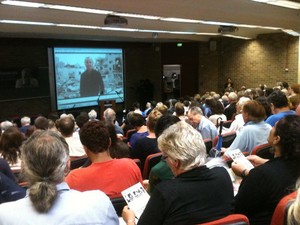
Ludlum said he was pleased with the big turnout and denounced the Labor government’s attacks on WikiLeaks and Assange. He urged WikiLeaks supporters to put the pressure on the government to choose democracy and freedom of speech over the US-Australia alliance.
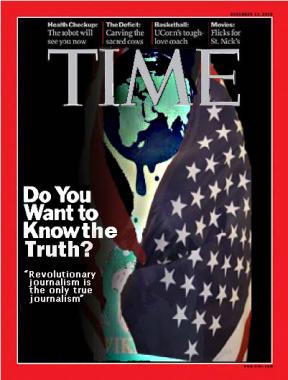
WikiLeak's rise to prominence as the world's first stateless media organization has carried it into the center of a massive storm of controversy. On one hand WikiLeaks and Julian Assange have widespread global support and have won numerous journalism awards. On the other hand, the US government portrayed them as a criminal entity, as a sort of spy organization and certainly not a member of the press protected by the First Amendment. Some top US officials called Assange a high-tech terrorist and should be prosecuted under the Espionage Act of 1917.
With inflamed rhetoric, many in the mainstream media have negatively framed the narrative of this new journalistic force and tried to distance themselves from it. By doing so, they attempted to deflect perception of WikiLeaks from the appearance of legitimacy associated with the word 'journalism'. One tactic was sensational personal attacks, with classic tabloid character assassination of Assange to distract the public from asking questions about the real actions of WikiLeaks. The other was sophisticated intellectual persuasion, where the corporate media criticized the organization, particularly questioning its journalistic status.
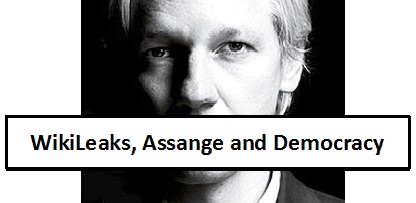
WikiLeaks, a free press publishing and media organisation, has revealed human rights abuses, war crimes and corruption in governments across the world. Yet the US Administration wants to close WikiLeaks down and prosecute its founder Julian Assange. International financial services organisations have blocked payments to WikiLeaks, denying them vital income. The Australian government has failed to take a stand against the political persecution of Assange. Australian Prime Minister Gillard's assertion that WikiLeaks' activities were illegal was proved to be false by an Australian Federal Police investigation.
What does this say about our democracy?
Speakers:
Scott Ludlam, Australian Greens Senator
Christine Assange, mother of Julian Assange
Humphrey McQueen, historian, Australian National University
and WikiLeaks and Assange lawyer Jennifer Robinson
Chaired by:
Mary Kostakidis, journalist and Australia's first primetime anchorwoman
FRIDAY 17TH FEBRUARY, 2012, 6.00 for 6.30 pm to 8.15 pm
University of Technology, Sydney
Room 13 (Building 2) Entrance level, UTS Tower, Broadway
Please note, there will be a preview screening of clips from an upcoming documentary featuring high profile supporters of Wikileaks and Julian Assange from 6pm.
Presented by the Support Assange & WikiLeaks Coalition with the support of the Australian Centre for Independent Journalism and the Stop the War Coalition Sydney.
Gold coin donation | For more information: Anne 0404 090 710 / Helen 0413 381 408
The BBC first announced this morning that the High Court of England and Wales* has listed court dates of 12-13 July to hear Julian Assange's appeal against extradition from the UK to Sweden.
BBC reporter Dominic Hurst tweeted shortly after his first announcement that "Assange's appeal is against Judge Riddle's ruling that extradition to Sweden wouldn't breach his human rights," a summary repeated in this report from the Guardian.
Mark Stephens @markslarks, Assange's UK solicitor, then replied to a first question on Twitter from a WLC reporter: "dates correct. Detail wrong." When questioned further by another WLC reporter hoping for a lawyerly update, he tweeted: "will come when I return to the UK."
There is obviously some time for precising our understanding of what the appeal may entail. Parliamentary review of the European Arrest Warrant (EAW) is also expected in June [citation needed and welcomed].
* NB: Scotland's legal system has always been independent from that of England and Wales.
UK MP quizzes Crown Prosecution Service over Assange extradition case
Liberal Democrat MP Julian Huppert has raised the relevance of the Human Rights Act to the role played by the UK Crown Prosecution Service (CPS) in Sweden's attempt to extradite Julian Assange.
In reply to Mr Huppert's questions during a joint committee hearing on human rights, Keir Starmer, director of Public Prosecutions, admitted that the CPS "are bound by the Human Rights Act, and we are bound by our duties to the court." However, he added that human-rights issues would be for the courts to determine rather than for the CPS.
Impenetrable though those legal distinctions may appear in the abstract, parliamentary attention to possible politicization of law is significant where it appears that the boundaries between law and politics are not clear and stable.
Australian MP and shadow minister reflects on WikiLeaks, Spycatcher, and freedom of the press
Malcolm Turnbull (L-Wentworth), former leader of the Opposition in the Australian House of Representatives and the current shadow minister for Communications and Broadband, spoke to Sydney University Law School on 31 March about his experiences representing former MI5 officer Peter Wright, author of Spycatcher, and about the concerns and responsibilities the Australian government faces relative to Assange's own situation and to WikiLeaks publications generally.
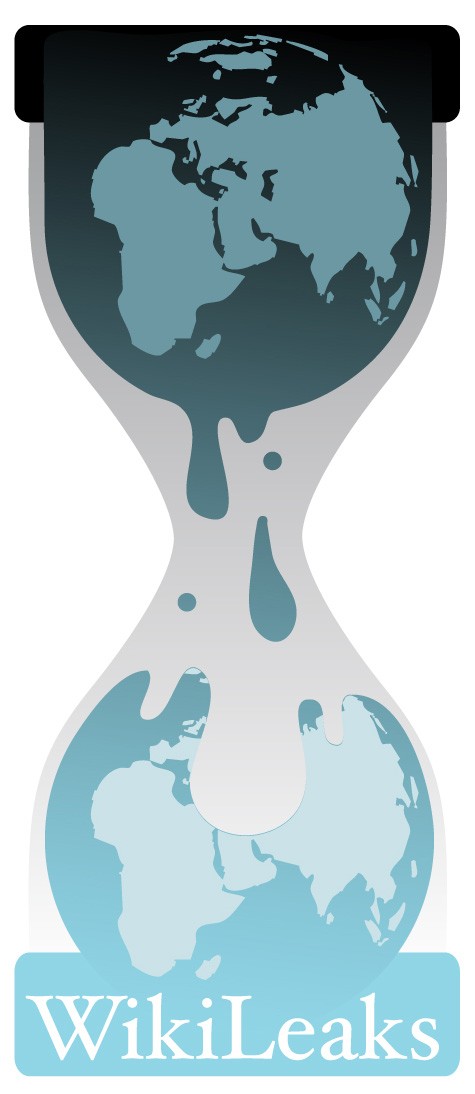 Debate: This House believes whistleblowers make the world a safer place
Debate: This House believes whistleblowers make the world a safer place
On 9 April, the Frontline Club and the New Statesman will host a public debate in which Julian Assange will speak for the proposition "This House believes whistleblowers make the world a safer place."
The debate will be chaired by Jason Cowley, editor of the New Statesman; other panelists have yet to be announced. The event will be held at Kensington Town Hall at 5 pm GMT; it is already fully booked but should be both livetweeted and filmed.
Rob Stary, Australian lawyer for Julian Assange and WikiLeaks: interview
Last week the WikiLeaks Australian Citizens Alliance (WACA) posted the video of an interview they did with Rob Stary, Julian Assange's lawyer in Australia, before the WikiLeaks Free Speech Forum in Melbourne on 4 February.
Some of the interview focuses on legal and political issues particular to Australia. More generally, however, Stary challenges the claims of a number of governments that their legal manoeuvres against Assange and/or WikiLeaks are unaffected by politics. His analysis of the international interplay between law and politics is a fine summary of the state of play so far.
Wednesday's forum on the tribulations surrounding WikiLeaks was timely and a much-needed shot in the arm for political discourse in Australia.
Framed through the lens of Julian Assange and WikiLeaks' David and Goliath struggle against the machine, the dominant theme of the night was the questioning of Australia's political identity and sovereignty in its unbalanced relationship with the United States, and how this imbalance has manifested itself in the lack of political and legal support provided to its citizens. Hence, some parallels between Julian Assange and previous Gitmo detainees David Hicks (present in the audience) and Mamdouh Habib were repeatedly made. On some levels, this may be seen as incongruous - Hicks and Habib were terror suspects, whereas Assange, despite hostile rhetoric, has not been accused of terrorism by a prosecuting authority - but the import of drawing these parallels is the same.
Open to the public, the seats inside Sydney's stately Town Hall filled up quickly, no doubt due to the caliber of the panelists rather than the rain pouring outside. The night's proceedings were emceed by Mark Kostakidis, veteran of Australian public broadcaster SBS. The speakers were the award-winning journalist John Pilger, member for Australian Federal Parliament and famous Iraq war whistleblower Andrew Wilkie, and tireless human-rights campaigner Julian Burnside QC.
Indeed, there were no "hawks" on the panel to provide opposition to the overall theme of libertarianism - not that the audience present minded, for this forum was a chance to escape the endless diatribes of said hawks, who are already in the privileged position of being able to pollute the airwaves, print and the web, stifling such fora under hackneyed pretexts of "national security" (to name but one).
Julian Assange has agreed to address the Cambridge Union on 15 March, reports the student paper The Tab.
The Union, officially the Cambridge Union Society, is a debating society founded in 1815 and is distinct from the student union. In addition to its weekly debates, it welcomes distinguished speakers from around the world.
The event will be open to Union members only. There is no word yet whether it might be otherwise transmitted.
Via @MarksLarks on Twitter
Paul Stephens, Australian ambassador to Sweden, last week formally requested assurances from Swedish Justice Minister Beatrice Ask concerning the treatment of Julian Assange under Swedish law.
In a letter written on the day of final arguments in Assange's extradition hearing last Friday,
Stephens explained that Assange "has been detained in his absence" by a Swedish court on suspicions of having committed "a criminal offence".
"I wish to convey the Australian Government's expectation that, should Mr. Assange be brought into Swedish jurisdiction, his case would proceed in accordance with due process and the provisions prescribed under Swedish law," the Australian ambassador.
He emphasised as well that he expected Assange's case to adhere to "applicable European and international laws, including relevant human rights norms."
The following is a reconstruction of the Julian Assange extradition proceedings on 11 February 2011 based primarily on the tweets of @federicacocco (Federica Cocco) and in much smaller part from the tweets of @channel4news. WL Central acknowledges those sources. The tweets have been preserved as much as possible and combined but are rewritten in parts for clarity, and legal terminology has been inserted where appropriate. Clarifying additions are generally in italics and may be assumptions within the legal context.
SC Robertson’s Submissions.
Robertson QC opens submissions with an account of the attack on Julian Assange by Fredrik Reinfeldt, prime minister of Sweden; Robertson says that Reinfeldt's comments earlier this week amount to his labelling Assange an "enemy of the people" in Sweden.
"This will influence a fair trial,” says Robertson, who quotes the prime minister as claiming that Assange and his lawyers are “sexist and condescending to Sweden."
The Swedish chancellor added to the prime minister's remarks, which Robertson says is an intolerable development; he adds that it is unprecedented for a government minister to comment in that way.
The Australian attorney general's response to an open letter to the Australian Prime Minister Julia Gillard re Julian Assange
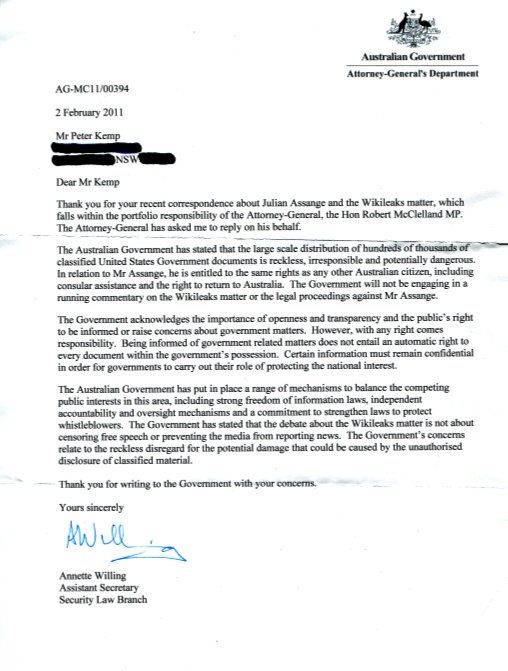
From the Guardian's timeline, rewritten for chronology and with legal terminology:
The hearing opened with Clare Montgomery QC, for the Crown Prosecution Service on behalf of the Swedish authorities. Opening submissions are that the Swedish prosecutor, Marianne Ny, is asserted to be an issuing authority for the purposes of a European Arrest Warrant (EAW).
In relation to the offences, the court decides that the alleged victims are to be called Woman A (three counts of sexual assault alleged) and Woman B (one count of r*pe alleged)
Ms Montgomery says the matters are extraditable offences because the definitions in the two countries are the same. "Mr Assange had sexual intercourse with her and exploited the fact that she was asleep." This is submitted to be an offence under English law. In relation to Woman A there are three counts of sexual assault "without consent" and again contrary to English law.
Julian Assange appears tomorrow, 7 February, at Westminster Magistrates Court for what has been announced as a two-day hearing, but judging from past extradition hearings in the UK, it is likely (with appeals) to take much longer, even a year or more, with the second-last word being that of the Supreme Court (formerly House of Lords) and then, under certain circumstances, the last word from the Home Secretary.
Readers should note that the procedure is not to judge the actual case on its merits as a criminal procedure but to judge it according to relevant sections of the UK Extradition Act. Such evidence of the alleged offences that has surfaced is only relevant indirectly, such as to prosecutorial abuses, not to the arguable merits of that evidence and a future case in Sweden if extradition occurs.
The Skeleton Argumentbegins with a challenge to prosecutor Ms Ny’s authority to issue an European Arrest Warrant (EAW). The case of Enander v. The Swedish National Police Board [2005] EWHC 3036 (Admin) is cited; it states that only the Swedish National Police Board is the authorised authority.
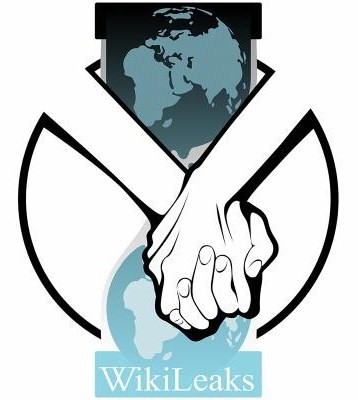 Julian Assange spoke today to a gathering in Melbourne organized by the WikiLeaks Defence Committee and the Australian Media, Entertainment and Arts Alliance, who presented Assange (via his lawyer) with his membership card in the union as a journalist.
Julian Assange spoke today to a gathering in Melbourne organized by the WikiLeaks Defence Committee and the Australian Media, Entertainment and Arts Alliance, who presented Assange (via his lawyer) with his membership card in the union as a journalist.
His filmed address, played to a free-speech forum at Federation Square in Melbourne, touched on a number of WikiLeaks' guiding principles as well as on immediate political pressures on the organization and on Assange himself. Repeatedly, he united those two concerns, principled and practical:
We at WikiLeaks recognize the difference between secrecy and privacy. ... We believe in transparent power, not in transparent people.
Via @Asher_Wolf and @joycelowenstein on Twitter, and Greg Mitchell at The Nation
This evening two of the editors who worked with WikiLeaks on the publication of the Afghan and Iraq war logs and the diplomatic cables, Alan Rusbridger of the Guardian and Bill Keller of the New York Times, will discuss their interactions with WikiLeaks on a panel hosted by the Columbia University Journalism School in New York City.
Jack Goldsmith, the former assistant attorney general who raised alarms within the US Department of Justice about DoJ legal opinions on torture and now a Harvard University law professor, will join the panel as discussant. The panel will be moderated by Emily Bell, director of the Tow Center for Digital Journalism at CJS.
In a recent tweet, WikiLeaks referred to some members of the panel as its "detractors."
The panel will be livestreamed at the CJS site at 7 pm EST.
The Sydney Peace Foundation has announced that it will award a rare gold medal to WikiLeaks publisher Julian Assange for his work on behalf of peace and justice worldwide. The Peace Medal, distinct from the foundation's annual Peace Prize, has been awarded to only three other individuals: the Dalai Lama, Nelson Mandela, and Japanese lay Buddhist leader Daisaku Ikeda.
Foundation director Stuart Rees said today:
"Peace from our point of view is really about justice, fairness and the attainment of human rights. ... Assange has championed people's right to know and has challenged the centuries-old tradition that governments are entitled to keep the public in a state of ignorance."
Prof Rees said Mr Assange's work was in the tradition of Tom Paine's Rights of Man and Daniel Ellsberg's Pentagon Papers - "challenging the old order of power in politics and in journalism".
"In the Paine, Ellsberg and Assange cases, those in power moved quickly to silence their critics even by perverting the course of justice."
Theme by Danetsoft and Danang Probo Sayekti inspired by Maksimer